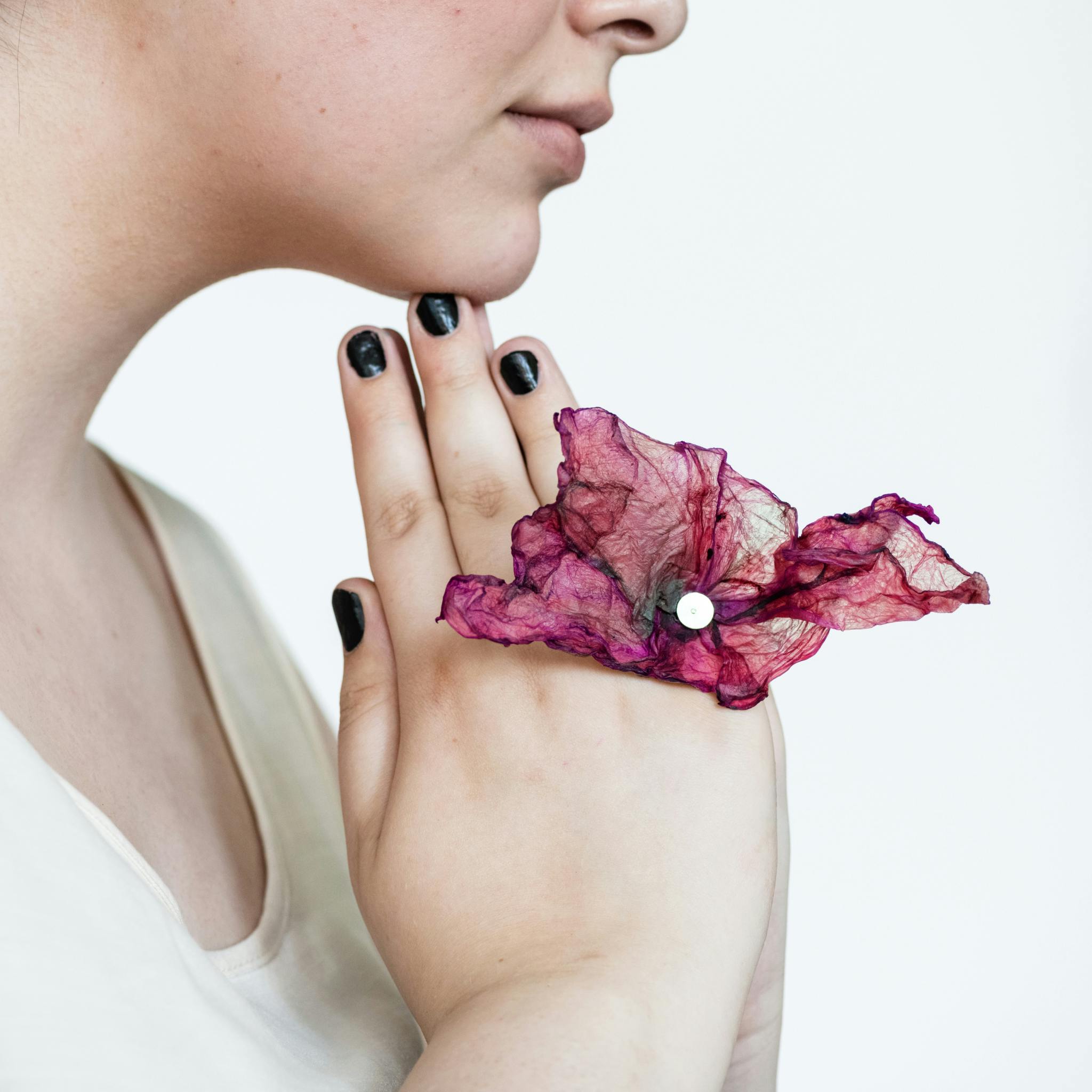Latest News
Experimenting with biomaterials at Arts University Plymouth
Wednesday, 29 March, 2023 — Artist and designer Sarah Clarkson left her career in banking to pursue an undergraduate crafts degree, finding a way to combine her interest in sustainability with her creative practice
<p dir="ltr">Artist and designer <a href="https://www.instagram.com/sarahclarksondesign/" target="_blank" rel="noreferrer noopener">Sarah Clarkson</a> joined Arts University Plymouth in 2019 to pursue an undergraduate crafts degree that would allow her to leave a career in banking for more purposeful work, finding a way to combine her interest in sustainability with her creative practice.</p>
<p dir="ltr">Sarah graduated with a First Class degree in BA (Hons) 3D Design Crafts (now <a href="https://www.aup.ac.uk/courses/undergraduate/ba-hons-craft-material-practices">BA (Hons) Craft & Material Practices</a>) in 2022, but early in her time at Arts University Plymouth her studies were interrupted unexpectedly by national lockdowns at the start of the COVID-19 pandemic. Sarah’s creative response to the constraints imposed by lockdown led to her learning to work with waste materials in her kitchen and developing a specialism in biomaterials.</p>
<p dir="ltr">We sat down with Sarah to find out what motivated her to leave behind a career in a high-street bank in favour of sustainable creativity, how her interest in biomaterials began, and why she’d recommend craft and material practices students should think seriously about working with kombucha.<br /></p>
<p dir="ltr">I had some experience working in ceramics and creating jewellery before joining Arts University Plymouth. I was unhappy in my job and looking for a new challenge that could combine sustainability and creativity.</p>
<p dir="ltr">After visiting an Open Day I felt like I could really see the university’s craft-based courses offering me a chance to pursue a more rewarding career, where I could feel like I was making a difference.<br /></p>
<p dir="ltr">I started my degree in September 2019 and had to deal with the national lockdown due to the pandemic right at the beginning of my studies. Studying at home, I learned to use waste materials from my kitchen. I combined food waste with a seaweed-based binder to create a biomaterial that was similar to ceramics and that was the start of my work in biomaterials.<br /></p>
<p dir="ltr">When <a href="https://www.aup.ac.uk/people/thomas-duggan">Thomas Duggan</a> joined Arts University Plymouth as a Lecturer, with one of his specialisms being biotechnology and biomaterials, he helped me to ask the right questions in my research and broaden my thought processes of where I could take my interest in biomaterials.</p>
<p dir="ltr">Thomas showed me a TED Talk by Suzanne Lee about making your own clothes by using bacteria to create cellulose, which really inspired me. That led me to think seriously about working with kombucha and in order to do that, we had to create a space within the craft and material practices workshops to work with biomaterials - the prototype for a biomaterials lab.</p>
<p dir="ltr">We set up the tanks to brew kombucha and harvest the cellulose skin. It takes between four and six weeks to grow thick enough to be usable, which gave me some conceptual time to explore form, shape and colour, as well as learning how to use natural dyes.<br /></p>
<p>It was important to me to learn how to colour my work naturally, because a lot of the early experiments that I’d seen with kombucha involved dull colours that detract from the end results.</p>
<p dir="ltr">I began creating dyes from food waste before spending some time in the Dye Lab with the Technicians, including Fiona Lloyd, experimenting with their natural dyes. This is an area that the university’s Textile Design team are leading research into, as a more sustainable alternative to synthetic dyes.<br /></p>
<p dir="ltr">The final outcome of my studies was an avant-garde jewellery collection that combined kombucha leather and natural dyes with my background as a jeweller. Kombucha was such an incredibly versatile material to work with. Depending on the length of time that you grow it, it can be used in so many different ways.</p>
<p dir="ltr">The process of making kombucha leather is environmentally friendly and the end product is biodegradable, which really minimises the long-term impact of a creative practice like mine. As someone interested in sustainability, I would definitely go back to Arts University Plymouth or recommend it as a place to study for anyone with similar interests.<br /></p>
<p dir="ltr">Sarah is currently studying a one-year PGCE and hopes to transition into a role as a secondary school teacher with specialisms in sustainability in design technology.</p>
<p dir="ltr">As a designer-maker she still makes and sells jewellery from her home studio on a small scale, while focussing on ways to embed her skills and research in teaching and influence the next generation of makers to work in more sustainable ways.</p>
<p dir="ltr">Sarah said: “I absolutely love my creative practice, but it has also been a lifelong ambition of mine to teach. I feel passionately that sharing my knowledge of sustainability with young people in this way will lead to a more sustainable future.” </p>
<p dir="ltr"><a href="https://www.aup.ac.uk/courses/undergraduate/ba-hons-craft-material-practices">BA (Hons) Craft & Material Practices</a> at Arts University Plymouth is an ever-evolving course at the forefront of thinking and making, with an increasing emphasis on ways that people in the UK’s craft industry can live harmoniously within natural and fabricated environments that support a healthy ecosystem.</p>
<p dir="ltr">Our spacious Materials Lab includes specialist facilities for ceramics, glass, metal and wood, encouraging you to explore traditional making alongside the rapid digital prototyping facilities in our Fab Lab, giving you the opportunity to reinvent craft for the 21st century. Visit our next <a href="https://www.aup.ac.uk/open-days">Open Day</a> on Saturday 24 June 2023 to find out more.</p>
